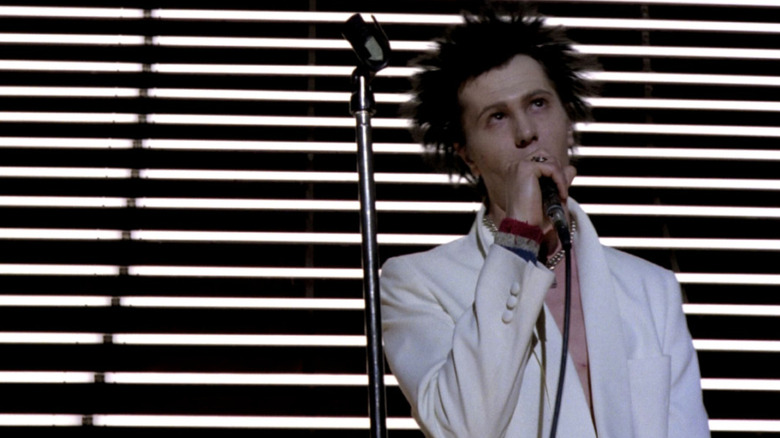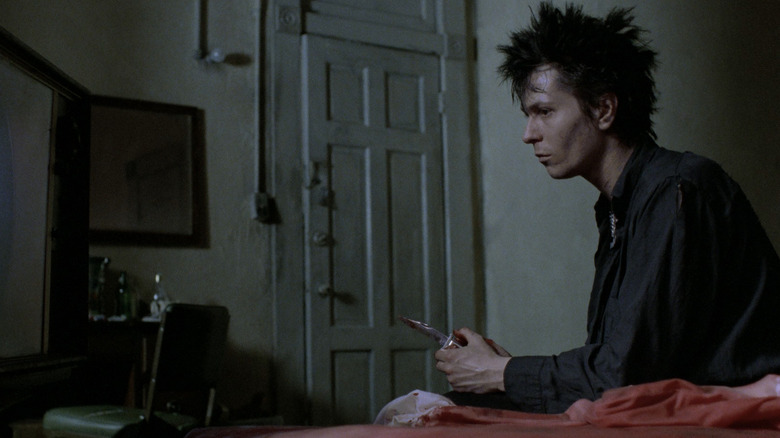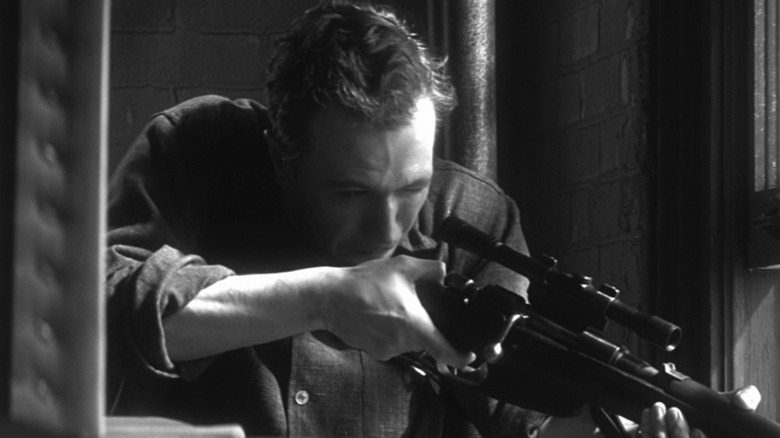Sid And Nancy Convinced Oliver Stone That Gary Oldman Could Handle JFK's Lee Harvey Oswald Role
"JFK" is one of the most controversial films ever made, because of the alternate view of a major historical event provided by its director Oliver Stone, a filmmaker long known for his unapologetic brashness and penchant for highly subjective narratives. Stone is an outspoken critic of The Warren Commission, which concluded that Lee Harvey Oswald acted alone to assassinate the president, and he saw "JFK" as his opportunity to offer a "counter myth to the official one."
Stone's version hypothesizes that Kennedy's peaceful policies made him an enemy of warmongering intelligence agencies, and that the CIA, FBI, and Secret Service conspired to get rid of him so they could wage war in Vietnam. He used a masterful blend of reenactments and archival footage in order to showcase his own theories, which led The Chicago Tribune to accuse him of "rewrit[ing] history." It's an accusation that Stone rejects. He told Speaking Freely in 2002 that "The 'JFK' movie was a hypothesis and it was always stated as such." This clarification did little to tamper down the accusations thrown at Stone and his film.
In addition to weaving together fact and fiction, and accusing the intelligence agencies of murdering the president, "JFK" portrays Lee Harvey Oswald, one of the most notorious murderers in history, as an innocent scapegoat. In order to pull that off, Oswald would have to transform from a psycho lone killer into a helpless victim of a corrupt system, which would require a highly talented actor. Gary Oldman embodied this skill in 1986's "Sid and Nancy," a performance in which Stone told Screen Rant he saw the "dark side he wanted."
A vicious little boy
"Sid and Nancy" explores the deadly dynamic between The Sex Pistols bassist and his girlfriend, which ended with Nancy Spungen dead and Sid Vicious in handcuffs. Initially, Vicious confessed to killing her, but later proclaimed his innocence. Thanks to his addiction to heroin, it's possible that he didn't even know whether he was responsible, and he died of an overdose before he could face trial. Even with this dark history, Vicious is often portrayed as a lost little boy in a grown man's body, who got in way over his head with fame, drugs, and a toxic relationship. That's the way Oldman portrayed him in "Sid and Nancy," and the performance landed him the role of Oswald.
Although the punk legend and accused assassin have nothing in common, Oldman infused both characters with a vulnerability that elicits sympathy. In "Sid and Nancy," Vicious is selfish and self-destructive, but it's still impossible not to feel something when Oldman's on the floor or a jail cell, shaking with withdrawals, or covered in blood with no memory of the night before. He portrayed Vicious like a lost child who naively stumbled into drugs and violence. He makes you feel guilty for coming to any judgments about the punk's behavior. It's a skill he'd use again in "JFK."
Oldman's Oswald is, in fact, "just a patsy," an intelligence agent whom the U.S. government frames for the killing of JFK. The idea sounds absurd at first because this is the guy we've been taught to believe killed the president, but it quickly becomes believable when you watch Oldman's performance.
He plays Oswald like a deer caught in the headlights, a loyal soldier who followed orders into a fatal trap, and once again, I find myself sympathizing with a dark figure of history.
'I think Oswald killed him'
Despite his ability to render the suspected assassin innocent and naive, Oldman doesn't think his version of Oswald actually existed. Unlike the rest of us, who can only draw conclusions from books and movies, Oldman met with Oswald's widow, daughter, and friends to prepare for the role. "[Stone] just gave me a bunch of pocket money and a couple of plane tickets," He told Nerdist in 2016. "And [he] said, 'go and meet these people and find out who Oswald was.' So [I was] both actor and investigator."
Oldman's investigation led him to believe that the official story was accurate, and that Oswald killed Kennedy, but he couldn't allow his personal opinions to get in the way of the role:
"[I had] to get on board with Oliver's vision because I [couldn't] walk on set every day and go, 'You know, I think Oswald killed him.' You're not going to get anywhere with that, so you have to jump on the train with him."
The working relationship wasn't compromised by their differing opinions, but neither man misses an opportunity to call the other out for being wrong. Oldman described Stone as a "conspiracy guy" and "one of the most paranoid men [he's] ever met." Stone told Screen Rant that Oldman was great in the film, but that he's "wrong about certain things, he doesn't really know the story of Oswald, so he's become more of a Warren Commission guy, now that's the shame."
Oldman calls the film's theories a vision. Stone calls them a "counter-myth." Some critics dismiss them as "lies." It isn't important what you believe, because films aren't about showing truths and communicating facts, they are about making you feel something, and both Oldman and Stone achieved this in "JFK."


